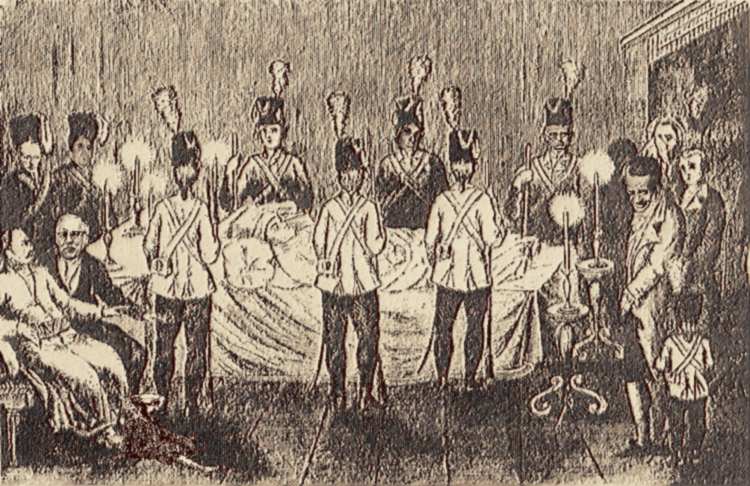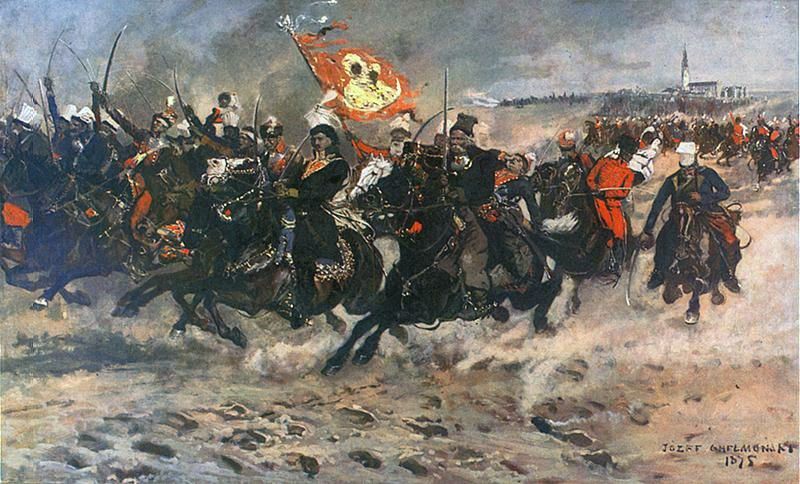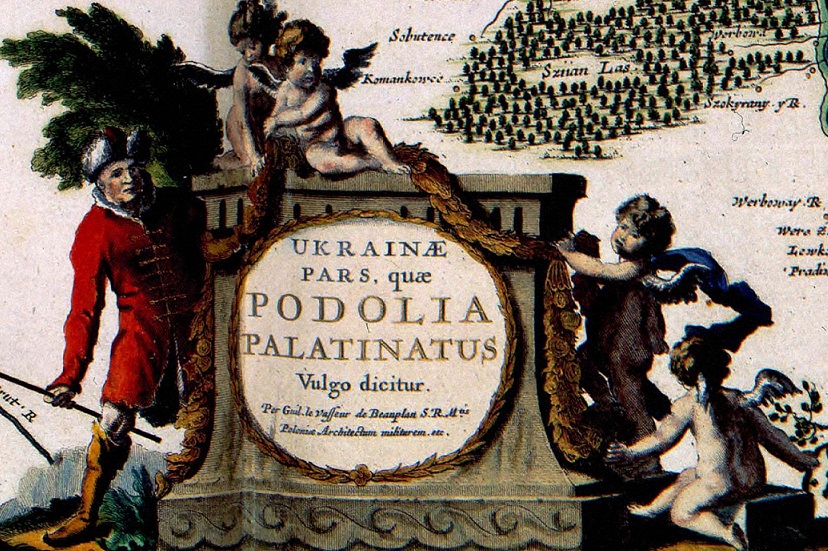|
Frankism
Frankism was a Sabbatean religious movement originating in Rabbinic Judaism of the 18th and 19th. centuries, Created in Podolia, it was named after its founder, Jacob Frank. Frank completely rejected Jewish norms, preaching to his followers that they were obligated to transgress moral boundaries, embracing antinomianism. The Frankists engaged in sexually promiscuous rites, such as the infamous 1756 incident in Lanškroun where they were allegedly caught dancing around a half-naked woman symbolizing the Shekhinah. At its height Frankism, claimed perhaps 50,000 followers, primarily Jews living in the Polish–Lithuanian Commonwealth, as well as in other regions of Central and Eastern Europe. Later, Frankists were encouraged to convert in mass to Catholicism. Description Frankists believed in Sabbatai Zevi, one of the most famous of all self-proclaimed messiahs in Jewish history. He believed in transgressing Jewish commandments to elevate the " divine sparks" constrained by ... [...More Info...] [...Related Items...] OR: [Wikipedia] [Google] [Baidu] |
Jacob Frank
Jacob Joseph Frank (; Yiddish: יעקבֿ פֿראַנק; ; born Jakub Lejbowicz; 1726 – 10 December 1791) was a Polish-Jewish religious leader who claimed to be the reincarnation of the self-proclaimed messiah Sabbatai Zevi (1626–1676) and also of the biblical patriarch Jacob. The Jewish authorities in Poland excommunicated Frank and his followers due to his heretical doctrines that included deification of himself as a part of a trinity and other controversial concepts such as neo- Carpocratian "purification through transgression". Frank’s teachings led his sect into scandalous practices, including ritualized orgies, incestuous acts—most notably between fathers and daughters—and the deliberate violation of Jewish moral laws, which he preached were necessary to hasten a messianic redemption through embracing the "abyss" of sin. Frank arguably created a religious movement, now referred to as Frankism, which incorporated aspects of Christianity and Judaism. His fo ... [...More Info...] [...Related Items...] OR: [Wikipedia] [Google] [Baidu] |
Sabbateans
The Sabbateans (or Sabbatians) are a variety of Jewish followers, disciples, and believers in Sabbatai Zevi (1626–1676), an Ottoman Jewish rabbi and Kabbalist who was proclaimed to be the Jewish Messiah in 1666 by Nathan of Gaza. Vast numbers of Jews in the Jewish diaspora accepted his claims, even after he outwardly became an apostate due to his forced conversion to Islam in the same year. Sabbatai Zevi's followers, both during his proclaimed messiahship and after his forced conversion to Islam, are known as Sabbateans. In the late 17th century, northern Italy experienced a surge of Sabbatean activity, driven by the missionary efforts of Abraham Miguel Cardoso. Around 1700, a radical faction within the Dönmeh movement, led by Baruchiah Russo, emerged, which sought to abolish many biblical prohibitions. During the same period, Sabbatean groups from Poland migrated to the Land of Israel. The Sabbatean movement continued to disseminate throughout central Europe and ... [...More Info...] [...Related Items...] OR: [Wikipedia] [Google] [Baidu] |
Antinomianism
Antinomianism ( [] 'against' and [] 'law') is any view which rejects laws or Legalism (theology), legalism and argues against moral, religious or social norms (), or is at least considered to do so. The term has both religious and secular meanings. In some Christian belief systems, an antinomian is one who takes the principle of salvation by faith and divine grace to the point of asserting that the saved are not bound to follow the moral law contained in the Ten Commandments. Christian antinomians believe that faith alone guarantees humans' eternal security in Heaven regardless of one's actions. The distinction between antinomian and other Christian takes on moral law is that antinomians believe that obedience to the law is motivated by an internal principle flowing from belief rather than from any external compulsion, devotion, or need. Antinomianism has been considered to teach that believers have a "license to sin" and that future sins do not require repentance. Johannes ... [...More Info...] [...Related Items...] OR: [Wikipedia] [Google] [Baidu] |
Harris Lenowitz
Harris Lenowitz is a professor of languages and literature at the University of Utah. He specializes in Hebraic studies, particularly the writings of the 18th-century Jewish messiah claimant Jacob Frank and the use of Hebrew in Christian art in the West. Education and career In 1966 Lenowitz received his B.A. in English from the University of Texas at Austin. He received his Ph.D. in Linguistics in 1971, also from the University of Texas at Austin. He remained at the university as a lecturer in 1971–1972. In 1972, he joined the faculty of the University of Utah as an assistant professor. He became an associate professor in 1976 and a full professor in 1989. Lenowitz has been a visiting professor at Hebrew University from 1980–1981; at Portland State University in the summers of 1976, 1980 and 1984; at the University of Washington in the summer of 1987; and at the University of Haifa from 1995–1996. He received the PEN International Center Prize in Translation in 1978. W ... [...More Info...] [...Related Items...] OR: [Wikipedia] [Google] [Baidu] |
Sabbatai Zevi
Sabbatai Zevi (, August 1, 1626 – ) was an Ottoman Jewish mystic and ordained rabbi from Smyrna (now İzmir, Turkey). His family were Romaniote Jews from Patras. His two names, ''Shabbethay'' and ''Ṣebi'', mean Saturn and mountain gazelle, respectively. Active throughout the Ottoman Empire, Zevi claimed to be the long-awaited Jewish Messiah and founded the Sabbatean movement. Central to his teachings was the belief that during the Messianic Age, acts traditionally considered sinful would transform into righteous ones. This antinomian doctrine led Zevi and his followers to deliberately violate Jewish commandments, a controversial practice that later inspired movements like the Frankists. Upon arriving in Constantinople in February 1666, Sabbatai was imprisoned on the order of the grand vizier Köprülüzade Fazıl Ahmed Pasha. In September of that same year, after being moved from different prisons around the capital to the imperial courts' seat in Adrianople (now Edi ... [...More Info...] [...Related Items...] OR: [Wikipedia] [Google] [Baidu] |
Częstochowa
Częstochowa ( , ) is a city in southern Poland on the Warta with 214,342 inhabitants, making it the thirteenth-largest city in Poland. It is situated in the Silesian Voivodeship. However, Częstochowa is historically part of Lesser Poland, not Silesia, and before the Partitions of Poland, 1795 Partition of Poland, it belonged to the Kraków Voivodeship (14th century – 1795), Kraków Voivodeship. Częstochowa is located in the Kraków-Częstochowa Upland. It is the largest economic, cultural and administrative hub in the northern part of the Silesian Voivodeship. The city is known for the famous Jasna Góra Monastery of the Order of Saint Paul the First Hermit of the Catholic Church, which is the home of the Black Madonna of Częstochowa, a shrines to Mary, mother of Jesus, shrine to Mary, mother of Jesus. Every year, millions of pilgrims from all over the world come to Częstochowa to see it. Częstochowa was also home to Frankism in the late 18th and 19th centuries, an antinom ... [...More Info...] [...Related Items...] OR: [Wikipedia] [Google] [Baidu] |
Podolia
Podolia or Podillia is a historic region in Eastern Europe located in the west-central and southwestern parts of Ukraine and northeastern Moldova (i.e. northern Transnistria). Podolia is bordered by the Dniester River and Boh River. It features an elongated plateau and fertile agricultural land covering an area of . The two main rivers serve as important trade channels. Podolia is known for its cherries, mulberries, melons, gourds, and cucumbers. The region has a rich history, dating back to the Neolithic, with various tribes and civilizations occupying it over time. It became part of the Kingdom of Galicia–Volhynia, the Golden Horde, the Kingdom of Poland, the Grand Duchy of Lithuania, the Ottoman Empire, the Habsburg monarchy of Austria, and the Russian Empire. In the 20th century, Podolia underwent various political changes, with both the Second Polish Republic and the Soviet Union controlling parts of it at different times. Podolian culture is renowned for its folk icon-p ... [...More Info...] [...Related Items...] OR: [Wikipedia] [Google] [Baidu] |
Jakob Baron Von Frank-Dobrucki Um 1790 (C) 1894 A
Jakob may refer to: People * Jakob (given name), including a list of people with the name * Jakob (surname), including a list of people with the name Other * Jakob (band), a New Zealand band, and the title of their 1999 EP * Max Jakob Memorial Award, annual award to scholars in the field of heat transfer * Ohel Jakob synagogue (Munich) Fictional characters * Jakob, a character from the video game ''Fire Emblem Fates'' See also * Jacob (other) Jacob is an important figure in Abrahamic religions. Jacob may also refer to: People * Jacob (name), a male given name and surname, including a list of variants of the name ** Jacob (Book of Mormon prophet) ** Jacob (surname), including a list ... * St. Jacob (other) {{disambiguation ... [...More Info...] [...Related Items...] OR: [Wikipedia] [Google] [Baidu] |
Orgy
An orgy is a sex party where guests freely engage in open and unrestrained sexual activity or group sex. Swingers' parties do not always conform to this designation, because at many swinger parties the sexual partners may all know each other or at least have some commonality among economic class, educational attainment or other shared attributes. Some swingers contend that an orgy, as opposed to a sex party, requires some anonymity of sexual partners in complete sexual abandon. Other kinds of "sex parties" may fare less well with this labelling. Participation in an "orgy" is a common sexual fantasy, and group sex targeting such consumers is a subgenre in pornographic films. The term is also used metaphorically in expressions, such as an "orgy of colour" or an "orgy of destruction" to indicate excess, overabundance. The term " orgiastic" does not generally connote group sex and is closer to the classical roots and this metaphorical usage. Ancient ''orgia'' In ancient Greek ... [...More Info...] [...Related Items...] OR: [Wikipedia] [Google] [Baidu] |
Company (military Unit)
A company is a Military organization#Commands, formations, and units, military unit, typically consisting of 100–250 soldiers and usually commanded by a Major (rank), major or a Captain (armed forces), captain. Most companies are made up of three to seven platoons, although the exact number may vary by country, unit type, and structure. Usually several companies are grouped as a battalion or regiment, the latter of which is sometimes formed by several battalions. Occasionally, ''independent'' or ''separate'' companies are organized for special purposes, such as the Air Naval Gunfire Liaison Company, 1st Air Naval Gunfire Liaison Company or the 3rd Force Reconnaissance Company. These companies are not organic to a battalion or regiment, but rather report directly to a higher level organization such as a Marine Expeditionary Force headquarters (i.e., a corps-level command). Historical background The modern military company became popularized during the reorganization of the S ... [...More Info...] [...Related Items...] OR: [Wikipedia] [Google] [Baidu] |
Brno
Brno ( , ; ) is a Statutory city (Czech Republic), city in the South Moravian Region of the Czech Republic. Located at the confluence of the Svitava (river), Svitava and Svratka (river), Svratka rivers, Brno has about 403,000 inhabitants, making it the second-largest city in the Czech Republic after the capital, Prague, and one of the List of cities in the European Union by population within city limits, 100 largest cities of the European Union. The Brno metropolitan area has approximately 730,000 inhabitants. Brno is the former capital city of Moravia and the political and cultural hub of the South Moravian Region. It is the centre of the Judiciary of the Czech Republic, Czech judiciary, with the seats of the Constitutional Court of the Czech Republic, Constitutional Court, the Supreme Court of the Czech Republic, Supreme Court, the Supreme Administrative Court of the Czech Republic, Supreme Administrative Court, and the Supreme Public Prosecutor's Office, and a number of state ... [...More Info...] [...Related Items...] OR: [Wikipedia] [Google] [Baidu] |
Ivanić-Grad
Ivanić-Grad or Ivanić Grad () is a town in Zagreb County, Croatia. Geography Ivanić-Grad is located south-east from Zagreb, connected: * by highway A3 (Bregana-Zagreb-Ivanić-Grad-Slavonski Brod-Lipovac) * by train on direction Zagreb - Slavonski Brod - Vinkovci. It is on the border of Moslavina and Posavina. Population In the 2011 census, the total population is 14,548, in the following settlements: * Caginec, population 555 * Deanovec, population 536 * Derežani, population 246 * Graberje Ivanićko, population 664 * Greda Breška, population 156 * Ivanić-Grad, population 9,379 * Lepšić, population 46 * Lijevi Dubrovčak, population 351 * Opatinec, population 321 * Posavski Bregi, population 816 * Prečno, population 98 * Prerovec, population 98 * Šemovec Breški, population 85 * Šumećani, population 494 * Tarno, population 57 * Topolje, population 112 * Trebovec, population 347 * Zaklepica, population 88 * Zelina Breška, population 99 In the ... [...More Info...] [...Related Items...] OR: [Wikipedia] [Google] [Baidu] |







